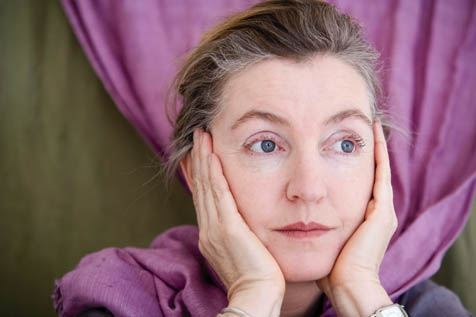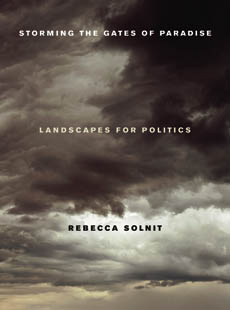Rebecca Solnit’s Storming the Gates of Paradise: Landscapes for Politics
Interconnected Landscapes

It’s not just the weather, the beautiful beaches, and the hiking that make Santa Barbara one of the best places in the world to live, although they could be indirectly responsible for one of our other advantages: the great number of luminary authors and thinkers who come to town each year. Santa Barbara is more than a beautiful natural setting-it’s an inspiring cultural landscape. But if this is paradise, we’re about to be taken by storm.

On October 4, writer Rebecca Solnit will visit from San Francisco to discuss her 11th book, Storming the Gates of Paradise: Landscapes for Politics. A collection of politically charged essays on topics ranging from her experiences observing the U.S.-Mexico border to stories of being arrested for environmental activism, this ambitious book communicates Solnit’s distinct perspective on what it means to be an American today, with all the economic, cultural, and environmental implications that go along with it.
Solnit wants no less than to challenge the ideas we have about our lives and the landscapes in which we live them. Although she is primarily a writer, part of that challenge involves speaking and interacting with audiences-an opportunity she relishes, since it allows her to enter a dialogue, and to better convey the complexities inherent in her topics. “There are infinite shades of grey,” she explained in a recent phone interview. “Writing often appears so black and white.”
According to Solnit, every aspect of our lives, our politics, and our societies are interrelated. It is impossible to see changes in the environment without also seeing complementary changes in the political terrain, Solnit suggested; the many landscapes that make up our existence are inseparable. To that end, much of the first half of her book deals with the views of Native Americans held by various groups and governmental agencies, addressing the ways in which this population has been mistreated and misunderstood, and what that means to the history of California. She writes about the issue in terms of a part of America that has been frequently neglected and abused-ultimately dealt with as a political landscape best forgotten. Yet the impact of indigenous Americans on the “natural” landscape is lasting and irrefutable, she points out. An area untouched by modern urbanization does not a wilderness make; when a hunter/gatherer culture depends on large swaths of land through which to roam, that land is in use. When we consider what the landscape meant to the Native Americans, Solnit noted, “The idea of virgin wilderness crashes and burns.” It’s just this sort of observation that makes Storming the Gates of Paradise such an intriguing read.
Most of the major themes in her essays are not new in and of themselves; however, Solnit makes them new by observing them from a slightly off-center viewpoint. Reading her essays or hearing her speak, one is never precisely sure what’s coming next, or how it will be analyzed, argued, or linked to other pieces of information or experience.
It’s just such interconnectedness-and blurred boundaries-that Solnit wants to illuminate, both in the title and the contents of her book. “Storming the gates of paradise” may sound like a threat, but it can also mean inclusion for everyone. It is, she acknowledged, a purposely ambiguous title, but ambiguity also implies a fluidity of perspective valuable to anyone in modern America.
4•1•1
Rebecca Solnit will give a free talk at UCSB’s Campbell Hall on Thursday, October 4, at 8 p.m. For more information, call 893-3535 or visit artsandlectures.ucsb.edu.



